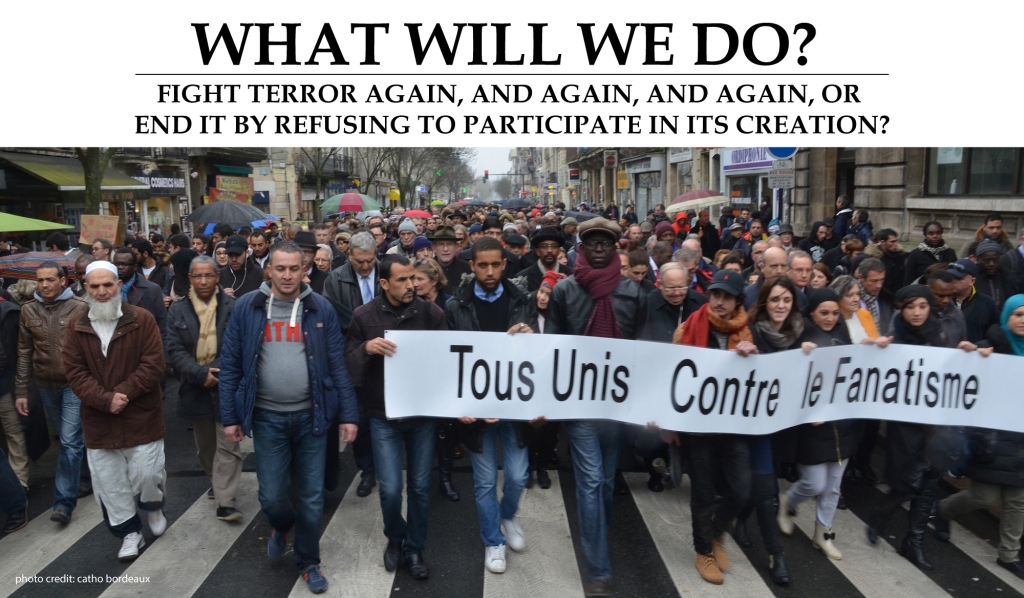The cycle of violence. When will it be interrupted? The attack on Charlie Hebdo was another incident of “Terror in [fill in the blank]… attackers part of [fill in name of terror network]”. It was an incident of home-grown terror, since the attackers were French-born second-generation immigrants. It is time to shift away from ineffective, reactive tactics and strategies of dealing with this kind of terror toward conflict transformation, by transforming the structures leading to terrorism.
Let’s be clear. The assassins in Paris did not avenge the Prophet and their horrific violence cannot be reconciled with Islam. They were not noble, holy warriors, they were violent criminals. They killed 12 people and in addition to those lives, the lives of their families were destroyed. Their attacks opened space for further destructive cycles of conflict, support for security crackdowns, and virtually endless military campaigns as we still are seeing in the post 9/11/01 global war on terror. If we continue on this path we “condemn the global community to ongoing terror”, as political scientist Lindsay Heger argues in her piece Redrawing our Strategy on Terror.
Here’s the usual:
At the height of conflict several things take place. First, we tend to see generalizations as we hear in the “clash of civilizations”, “us versus them”, or the “battle between Islam and freedom of speech.” Second, there is stereotyping, as we can see in the generalizations and assumptions about all members of a group. In this case a group as large and diverse as the 1.6 billion Muslims in the world. Third, there are knee-jerk reactions like calls for “collective detention” or “nuke them” by many so-called internet trolls. These often come with dehumanization of the other group. Fourth, tit-for-tat tactics are used as we can see in the attacks on Mosques in France. Fifth, the issues are changed deliberatively as we can see in US mainstream media commentators using the attack to promote torture or criticize New York City’s Mayor de Blasio’s politics. Sixth, emotions are exploited, fear is installed, and drastic measures are advocated as we see in far-right National Front political party leader Marine Le Pen’s call for a referendum on reinstating the death penalty. All these are destructive, but very commonly used approaches of dealing with conflict. All these are ways of us participating in the cycle of continuing terror.
Here are some immediate better ways:
First and foremost, national and international law enforcement and judicial processes for individuals and groups involved in acts of terror.
Second, a call for unity from the international community, political, cultural and religious leaders condemning all forms of violent extremism.
Third, a societal response of answering hatred with love and compassion, as we have seen in Norway’s dignified response to the mass murder by islamophobic Anders Breivik.
Here are some long-term responses addressing broader, structural changes:
First, terrorism is a political problem. The colonial history and the current violent western presence in the Middle East as well as the arbitrary support for some dictators are key to providing terrorists with a support base without which they would not be able to operate and even exist. As we see this support base now goes far beyond the Middle East and has reached the suburbs of Paris and inspires other unconnected lone-wolf terrorists. Lindsay Heger argues correctly that we need to create creative governance solutions aimed at de-linking terrorists from societies. This applies just as much to groups like Boko Haram in Nigeria as it applies to the Muslim immigrant population in France.
Second, terrorism is a social problem. The gunmen were French-born descendants of Algerian immigrants. It is nothing new that there are tensions between the predominantly white, Christian, French society and mainly Muslim first and second generation immigrant populations of African origin. The majority of immigrants belong to the economic lower class of society. Poverty, unemployment and crime are common issues the young, male immigrants are facing.
Third, terrorism is a cultural problem. Muslim immigrant populations in Europe need to be able to freely develop and express their sense of self and sense of belonging. The politics of integration must allow for diversity and co-existence without imposed assimilation and inequality.
Some might argue that these suggestions have flaws, that they are not perfect, that they will never work, and so on. Yes, they have flaws, they are not perfect, and sometimes we do not know the outcome. What we know for sure is that more militarized security, sacrificing our rights, and more military campaigns make us participants in terror. And they definitely do not work unless our intent is to recruit more terrorists.
Terrorists will be part of us as long as we don’t address the root causes and as long as we participate in it. Terror ends when we stop creating terrorists and when we stop participating in it.

